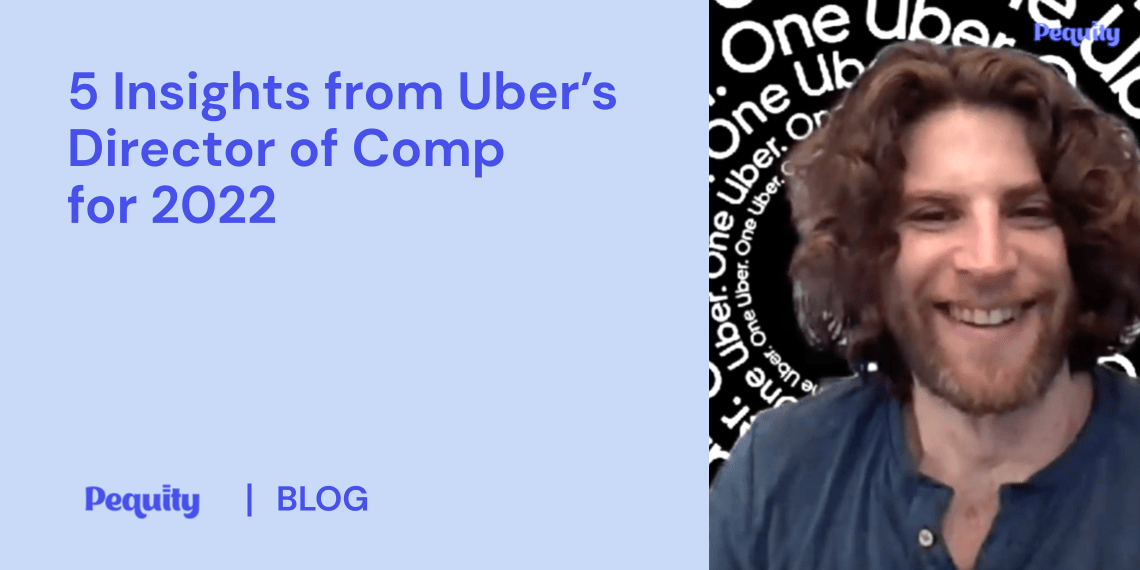We recently sat down with Uber’s Head of Compensation, Sam Gilbert.
Sam spoke with our CEO, Kaitlyn Knopp, about the state of recruiting and compensation in 2022, and offered some of his best advice.
“It’s such an exciting time in our field,” he noted.
“Equity is changing rapidly. Companies now are hiring remotely all over the world. Wall Street and Hedge funds are now hiring engineers. It’s amazing.”
You can watch the chat in its entirety on YouTube, but we took the liberty here of selecting some of the best insights from their discussion.
Below we outline the five most interesting points made by Uber’s Director of Compensation.
Compensation Insights from Uber
Sam Gilbert offered several insights unique to 2022.
In a post-pandemic world, compensation is changing rapidly.
In Sam’s words, “Things that used to take a decade to develop, are now changing day to day.”
Here are his best insights from our recent chat.
1.
Engineering competition is at its most intense.
Wall Street and Hedge Funds are hiring engineers as intensely as tech companies. And the pandemic brought a remote-first world that meant global companies were suddenly competing for top talent—in Silicon Valley and beyond.
These rapid changes, where nearly every company is becoming a tech company, is causing an explosion in engineering jobs.
If you know how to code, you undoubtedly have job security in the future.
2.
Equity is now more than a retirement vehicle.
Compared to years’ past, employees now have a better understanding of equity, and how it works for them.
As a result, many companies—especially in tech—are using equity in new ways.
Instead of thinking about equity as a sizable retirement check, employees are using it as a way to pay off student loans, or help them acquire a first home.
For instance, Snap Inc. (Snapchat) is offering equity sign-ons, meaning new employees are “owners” from day one.
Other companies are offering 1-year cliffs, instead of the traditional 4-year equity grant.
We’ll continue to see equity used in new ways in 2022 to compete in this new global market.
3.
Don’t quote survey data as the end-all, be-all.
Uber’s Sam Gilbert gives this tip to recruiters and comp professionals looking to set ranges.
“’Radford says this’ won’t work in most situations,” said Sam.
Survey data is simply a reference point—not a guide on ranges for every company.
Ultimately, executives care about offer acceptance rate, retention rate, and budget. That will matter more when it’s time to extend new offers.
4.
Hiring employees away from places like Google and Facebook is out-of-budget for most companies.
One of the harsher realities of hiring the best tech talent is it takes a big budget.
“To buy these employees out of their current employment,” said Sam, “you effectively have to pay them a huge sum of money to get out of that place.”
As such, the top end of the market, hoarded by companies like Google and Facebook, are out of reach for nearly all companies.
Fortune 500 companies will be able to fish from this pond, but even they will get a lump in their throat when negotiating someone away from Google.
5.
Be Prepared to List Salaries In Your Open Requisitions
“Tech companies operate chiefly in three states—Washington, New York, and California,” said Sam.
“So, with New York instantiating these pay transparency laws, we can expect others to follow suit.”
New Companies will have two options here for their approach to listing ranges in the job posting.
“One, you can have a really wide range, say from one to a million,” Sam said smiling. “Or two, you can list a pretty narrow range, and offer a differentiator, which will most likely be equity.”
Whatever your approach, expect to include salary ranges in your job openings in the years to come.
The Future of Compensation
Chatting with compensation leaders at Nike and Uber has given us the opportunity to learn so much about the state of HR.
At Pequity, we’re creating the future of pay equity and compensation by streamlining workflows for those in HR.
Pequity helps you make faster, more accurate offers, and keeps your budget in line by highlighting outliers in your employee compensation.
If you’d like to see how Pequity works, book a demo today to see how you can automate your HR workflows.

Comments